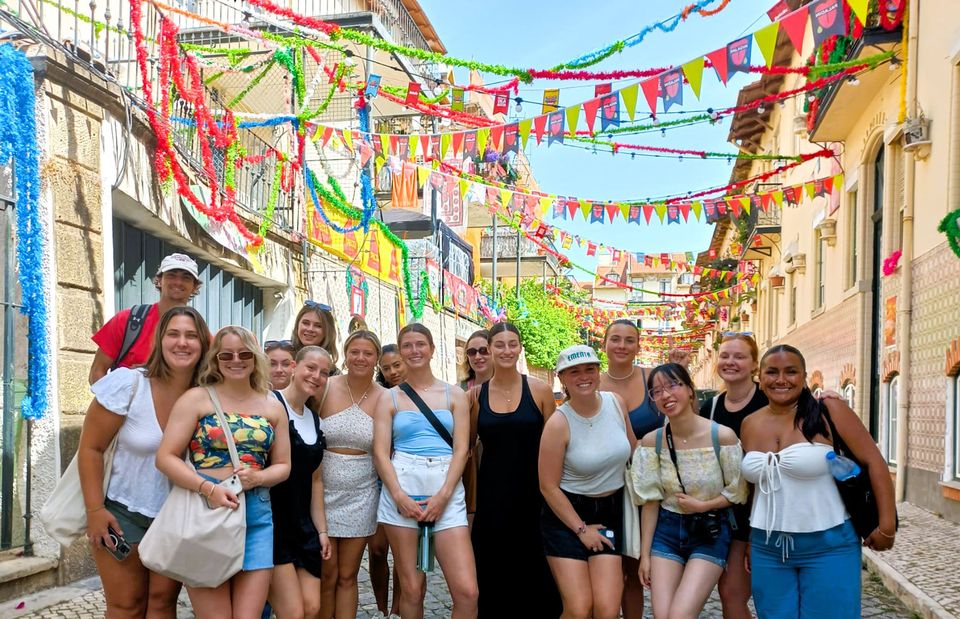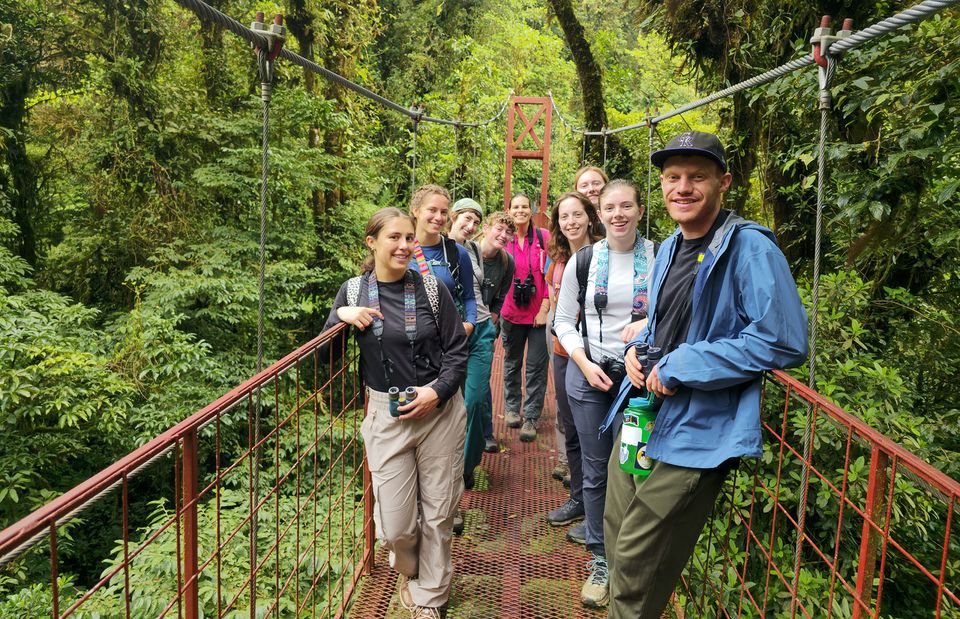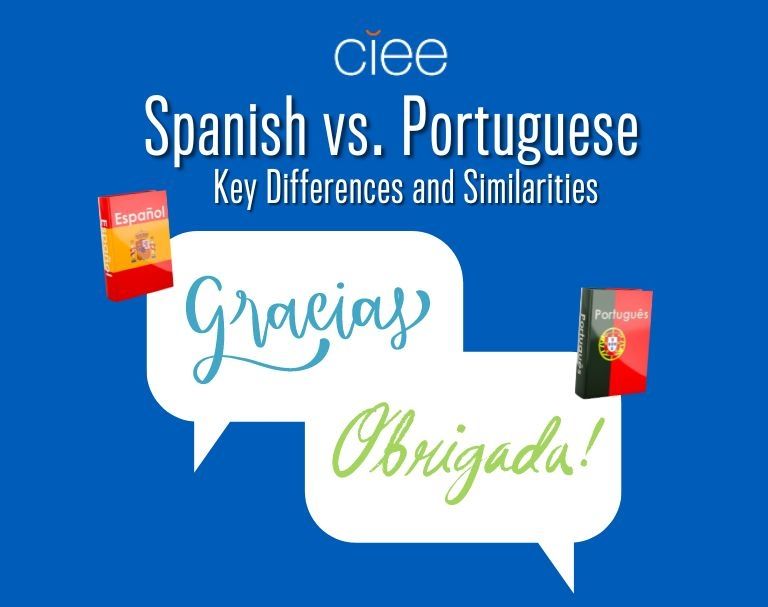Portuguese vs. Spanish Language: Key Differences & Similarities
Olá! ¡Hola! Torn between learning Portuguese vs. Spanish while studying abroad? You're not alone. These two languages are like siblings – similar in some ways, totally different in others. Whether you're dreaming of eating pastéis de nata in Portugal or sipping café con leche in Spain, knowing the ins and outs of Spanish vs. Portuguese can set you up for an unforgettable experience.
So, stick around as we explore Portuguese vs. Spanish, uncover their unique quirks, and highlight some awesome CIEE programs where you can immerse yourself in either language!
Portuguese vs. Spanish: Quick Overview
At first glance, Portuguese and Spanish might seem like twins separated at birth, but dig a little deeper, and you'll find they each have their unique flavor. Spanish is the second most spoken language in the world, boasting around 500 million speakers across several countries, including Mexico, Spain, the Dominican Republic, Chile, and many more! Portuguese, while slightly less widespread, still packs a punch with around 300 million speakers. It's the official language of Brazil, Portugal, and a few other countries scattered across Africa and Asia.
While both languages share Latin roots, they’ve evolved differently, leading to distinct dialects and regional variations. In terms of Portuguese vs. Spanish difficulty, native English speakers might find Spanish a bit easier due to its straightforward pronunciation and familiar vocabulary. Portuguese, with its nasal sounds and trickier grammar, might pose a bit more of a challenge. But don't worry – whichever language you choose, you'll be unlocking a whole new world of culture and connections.

Read More: Portugal vs. Spain Study Abroad: Which is Better?
Portuguese vs. Spanish Differences
While Portuguese and Spanish are like cousins in the Romance language family, their differences are enough to keep things interesting. Pronunciation is where you'll notice the biggest split. Spanish tends to be more phonetic, meaning words are generally pronounced as they’re spelled. Portuguese, on the other hand, has some nasal sounds and silent letters that can throw you off if you're not careful.
Grammar also presents some challenges – Portuguese verbs can have more variations than their Spanish counterparts, especially in the past tense. Vocabulary-wise, you'll find plenty of words that are identical (or nearly so), but don't be fooled by false friends! For example, "embarazada" in Spanish means pregnant, while "embaraçada" in Portuguese just means embarrassed. That could lead to some awkward misunderstandings! Overall, while the languages share a lot, the differences are significant enough that speaking one doesn’t automatically mean you’ll understand the other.
Read More: Why Study Abroad in Portugal: 4 Key Reasons
Common Spanish vs. Portuguese Phrases
Here are some common phrases in both languages that you might use on your adventures abroad. See if you can spot the similarities!
Spanish Phrases
- “Buenos días” meaning “good morning”
- “Por favor” meaning “please”
- “¿Como te llamas?” meaning “what’s your name?”
- “¿Dónde está el baño?” meaning “where is the bathroom?”
- “No entiendo” meaning “I don’t understand”
Read More: Top 10 Spanish Slang Words and Phrases You Need to Know
Portuguese Phrases
- “Bom dia” meaning “good morning”
- “Por favor” meaning “please”
- “Como te chama?” meaning “what’s your name?”
- “Onde fica a casa de banho” meaning “where is the bathroom?”
- “Não entendo” meaning “I don’t understand”
You can see how some of the words are strikingly similar in appearance and sound due to their shared Latin roots. Regardless of which language you decide to pursue, you’re in for a Latin treat!

Is It Better to Learn Spanish or Portuguese?
Ah, the age-old question – Spanish or Portuguese? The answer really depends on your goals and interests. If you're looking for widespread utility, Spanish is the clear winner. With 21 countries where it's the official language, knowing Spanish opens doors across Latin America, Spain, and even parts of the United States. Plus, it's often considered easier to learn for English speakers.
However, Portuguese offers its own unique charm, especially if you’re drawn to the rich culture and history of Portugal. Portugal is a European gem, known for its stunning coastlines, vibrant cities like Lisbon and Porto, and a deep cultural heritage that dates back centuries. While Brazil is the largest Portuguese-speaking country, Portugal itself offers a fascinating blend of old-world traditions and modern influences, making it a fantastic place to study and immerse yourself in the language.
So, whether you're captivated by the ancient streets of Portugal or the dynamic energy of Spanish-speaking countries, the "better" language is the one that aligns with your passions and study abroad goals!
Read More: Study Abroad in Latin America: The Ultimate Guide
How Long Does it take to Learn Spanish vs Portuguese?
The good news is that both Spanish and Portuguese are relatively quick for English speakers to pick up. According to the Foreign Service Institute (FSI), you can reach proficiency in Spanish in about 600-750 hours of study. Portuguese is in the same ballpark, though it might take a bit longer depending on how tricky you find the pronunciation.
Your learning speed will depend on a few factors: Your prior experience with language learning, how often you practice, and whether you immerse yourself in the language through travel, media, and conversation. Spanish might give you faster rewards in terms of comprehension and speaking, but with dedication, Portuguese will soon become second nature too. So, whether you’re gearing up for a semester in Madrid or a summer in Lisbon, with the right approach, you’ll be impressing locals in no time!

Read More: The Ultimate Guide to Studying Abroad in Spain
Where Can I Learn Spanish or Portuguese with CIEE?
Now that you’ve got a taste of the differences between Spanish vs. Portuguese, let’s explore some of the exciting CIEE programs and diverse locations where you can dive into learning these languages!
CIEE Spanish Language Programs
Ready to immerse yourself in the world of Spanish? CIEE offers incredible opportunities to learn Spanish across Spain, Costa Rica, Dominican Republic, Mexico, Argentina, and Chile. Whether you're drawn to the historic streets of Spain, the energetic cities of South America, or the tropical climates of Latin America, there's a program that’s perfect for you. Take a look at some of our program offerings – and we must warn you, there’s a lot! To make your search easier, try to narrow down to your top two countries first.
- Summer Global Internships Language Immersion in Barcelona, Spain
- Summer Global Internship Language Immersion in Seville, Spain
- Summer Intensive Spanish Language in Alicante, Spain
- Liberal Arts in Madrid, Spain
- Liberal Arts in Barcelona, Spain
- Advanced Liberal Arts in Barcelona, Spain
- Business + Culture in Barcelona, Spain
- Advanced Liberal Arts in Seville, Spain
- Communications, New Media + Journalism Spanish in Seville, Spain
- Business + Society in Seville, Spain
- Liberal Arts in Seville, Spain
- Liberal Arts in Alicante, Spain
- Summer Intensive Spanish Language in Buenos Aires, Argentina
- Summer Community Public Health in Buenos Aires, Argentina
- Liberal Arts in Buenos Aires, Argentina
- Summer Community Public Health in Santiago de los Caballeros, Dominican Republic
And so many more!
Read More: What are the Best Places to Study Abroad in Latin America?
CIEE Portuguese Language Programs
If you're eager to master Portuguese and dive deep into the culture of this beautiful language, CIEE has you covered. Our Portuguese language programs offer an immersive experience in Portugal, where you can explore everything from the lively streets of Lisbon to the charming towns along the coast. Whether you’re strolling through historic neighborhoods or indulging in delicious local cuisine, you'll be surrounded by opportunities to practice your language skills.
Check out our Portugal study abroad programs below:
- Lisbon Business + Culture
- Lisbon Language + Culture
- Semester in Lisbon
- January in Lisbon
- Summer in Lisbon
- Lisbon Summer Global Internship

Read More: Study Abroad in Portugal: FAQs
Portuguese vs. Spanish: What'll it Be?
Both Portuguese and Spanish open a treasure trove of cultural experiences, from the captivating flamenco rhythms of Spain to the enchanting streets of Portugal. With CIEE Study Abroad, your journey promises to be full of excitement, discovery, and connection. The hardest part? Deciding which path to take.
The adventure of a lifetime awaits – are you ready to say “Olá” or “Hola”?
Related Posts
8 Best Study Abroad Programs in Costa Rica
Dreaming of palm trees, pristine beaches, and endless adventure? Costa Rica study abroad might be exactly what you’ve been looking for! Known for its incredible biodiversity, "pura vida" lifestyle, and... keep reading
What are the Best Places to Study Abroad in Latin America?
If you’re reading this, you’re probably ready to take your college experience to the next level with an extraordinary study abroad adventure. What better way to do than by discovering... keep reading
What are the Best Places to Study Abroad in Latin America?
If you’re reading this, you’re probably ready to take your college experience to the next level with an extraordinary study abroad adventure. What better way to do than by discovering... keep reading



